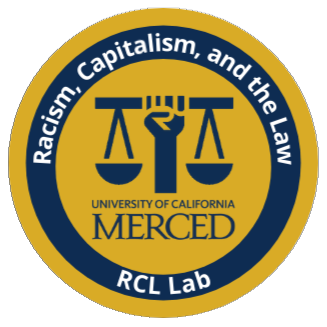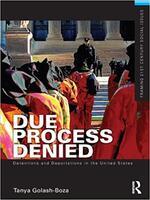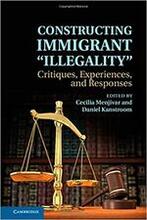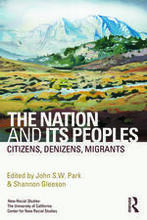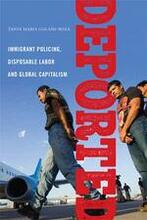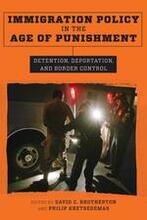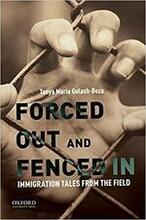- Home
- Deported
Deported
Due process protections are among the most important Constitutional protections in the United States, yet they do not apply to non-citizens facing detention and deportation. Due Process Denied describes the consequences of this lack of due process through the stories of deportees and detainees. People who have lived nearly all of their lives in the United States have been detained and deported for minor crimes, without regard for constitutional limits on disproportionate punishment. The court’s insistence that deportation is not punishment does not align with the experiences of deportees. For many, deportation is one of the worst imaginable punishments.
This article reviews how US deportations ballooned between 1997 and 2012, and underscores how these deportations disproportionately targeted Latino working class men. Building on Mae Ngai’s (2004) concept of racial removal, we describe this recent mass deportation as a gendered racial removal program. Drawing from secondary sources, surveys conducted in Mexico, the U.S. Department of Homeland Security published statistics, and interviews with deportees conducted by the first author in Guatemala, the Dominican Republic, Brazil and Jamaica, we argue that: (1) deportations have taken on a new course in the aftermath of 9/11 and in the wake of the global economic crisis – involving a shift towards interior enforcement; (2) deportation has become a gendered and racial removal project of the state; and (3) deportations will have lasting consequences with gendered and raced effects here in the United States. We begin by examining the mechanisms of the new deportation regime, showing how it functions, and then examine the legislation and administrative decisions that make it possible. Next, we show the concentration of deportations by nation and gender. Finally, we discuss the causes of this gendered racial removal program, which include the male joblessness crisis since the Great Recession, the War on Terror, and the continued criminalization of Black and Latino men by police authorities.
Once forcibly returned to their countries of citizenship, how and why do deportees engage in transnational relationships? Through analyses of 37 interviews with Jamaican deportees, I approach the question of why deportees engage in transnational practices and reveal that deportees use transnational ties as coping strategies to deal with financial and emotional hardship. This reliance on transnational ties, however, has two consequences: (1) male deportees who rely on transnational strategies to survive face a gendered stigma because they must relinquish the provider role and become dependants; and (2) the transnational coping strategies serve as a reminder of the shame, isolation and alienation that deportees experience because of their deportation. This consideration of the consequences of transnational relationships sheds light on why some migrants are transnational and others are not.
The number of people being removed from the USA on an annual basis is far higher than ever before. The increases in removals since the passage of the 1996 laws have had a disproportionate impact on Mexican and Central American male immigrants. Moreover, the changes made to the laws in 1996 were draconian insofar as they removed judicial discretion in certain removal cases, and the laws were applied retroactively. The raced and gendered disparities in immigration law enforcement are one more instance of institutionalized racism in the USA insofar as these laws primarily harm black and Latino families.
The United States currently is deporting more people than ever before: 4 million people have been deported since 1997—twice as many as all people deported prior to 1996. There is a disturbing pattern in the population deported: 97% of deportees are sent to Latin America or the Caribbean, and 88% are men, many of whom were originally detained through the U.S. criminal justice system. Weaving together hard-hitting critique and moving first-person testimonials, Deported tells the intimate stories of people caught in an immigration law enforcement dragnet that serves the aims of global capitalism. Tanya Golash-Boza uses the stories of 147 of these deportees to explore the racialized and gendered dimensions of mass deportation in the United States, showing how this crisis is embedded in economic restructuring, neoliberal reforms, and the disproportionate criminalization of black and Latino men. In the United States, outsourcing creates service sector jobs and more of a need for the unskilled jobs that attract immigrants looking for new opportunities, but it also leads to deindustrialization, decline in urban communities, and, consequently, heavy policing. Many immigrants are exposed to the same racial profiling and policing as native-born blacks and Latinos. Unlike the native born, though, when immigrants enter the criminal justice system, deportation is often their only way out. Ultimately, Golash-Boza argues that deportation has become a state strategy of social control, both in the United States and in the many countries that receive deportees.
This article explores the precarious conditions deported Guatemalans encounter in their country of birth, alongside a consideration of how Guatemalan deportees’ agency is structured by precarity yet mediated by individual factors such as foreign-earned capital and negative credentials. Previous research has found that deportees are often criminalized, stigmatized, and blamed for social problems. Researchers have also found that deportees can be well-suited for work in the transnational call center sector when they have adequate English skills. This raises the question of how deportees’ individual characteristics and the local context of reception influence their (re)incorporation. This study, based on interviews with 34 Guatemalan deportees, reveals that deportees have varied trajectories, yet that the availability of call center jobs combined with deportees’ capacity and agency creates a bifurcation in labor market outcomes between deportees who secure jobs in call centers and those who do not.
The implementation of restrictive immigration laws in 1997 in the United States has led to the deportation of hundreds of thousands of legal permanent residents—denizens who had made the United States their home. Mass deportations of denizens have given renewed importance to territorial belonging and legal citizenship for theories of citizenship, a relatively neglected area of scholarship in this field. This article draws from interviews with 30 deported Jamaicans who were once legal permanent residents of the United States to argue that denizens often feel “like citizens” based on their family and community ties to the United States, yet that their allegiance and sense of belonging is primarily to their family and community—not to the state. In this sense, there is a disconnect between the law—which privileges legal citizenship—and the daily lives of denizens—in which they can experience a profound sense of belonging in their communities.
Structural racism — in the form of heavy policing, residential segregation, and limited social services and labor opportunities — combined with changes in immigration laws in 1996 and the rise of immigration policing in the early twenty-first century has shaped the incorporation patterns of Black and Latino male immigrants. This article puts policing and incarceration at the center of the analysis by asking how mass incarceration and structural racism have affected the incorporation trajectories of Black male immigrants. Drawing from 29 interviews with deportees in the Dominican Republic and Jamaica, I argue that gendered structural racism has a greater impact than individual attitudes on the trajectories of black male immigrants. Just as gendered racial removal affects Latino communities through mass deportation, gendered structural racism affects black and Latino immigrant communities through local and immigration law enforcement cooperation.
This chapter analyses the experiences of isolation, precarity, and resilience of Dominican deportees. The context of reception of persons deported from the USA to Latin American and Caribbean countries is highly dependent on the cultural context and laws of each country. However, recent research has shown that deportees suffer isolation and stigmatisation that has clear effects on their social and labour market reintegration. This chapter, drawn from 46 interviews with Dominican deportees, explores how highly stigmatised individuals with minimal job experience find opportunities in the precarious and informal Dominican labour market. The ability of Dominican deportees to re-integrate is in part due to their ability to access the limited labour market opportunities, as well as through remittances from family members in the USA.
This chapter considers how biased policing practices, combined with institutional cooperation between immigration and criminal law enforcement agents, influences broader trends in deportation. Deportation laws in the United States are race- and gender-blind, but their implementation is not. Ninety-four per cent of interior removals involve men, even though women account for 47 per cent of unauthorized immigrants in the United States. And, 88 per cent of interior removals involve people from just four countries: Mexico, Guatemala, Honduras, and El Salvador, even though nationals from these countries only make up 66.3 per cent of unauthorized migrants. An analysis of how deportations happen that puts together on-the-ground practices of policing with immigration law enforcement cooperation helps us to understand these gendered and racialized patterns of deportation. This chapter draws from interviews with 117 deportees in the Dominican, Republic, Jamaica, and Guatemala in 2009 and 2010.
Deportees’ reintegration is shaped by the contexts of reception in their countries of origin and the strength of their ties to the United States. For some, the deprivation and isolation of deportation is akin to a death sentence.
More than six million people have been deported from the United States since 1996. The Dominican Republic is one of the top ten countries to which deportees are sent. Most scholarship on deportation focuses on the challenges deportees face post-deportation. There is also a long history of scholarship on how migrants draw from social, human and financial capital to integrate into host societies. This article thus asks what forms of capital are useful for deportees’ re-integration and focuses on the forms of capital deportees draw from to survive in the aftermath of deportation. An analysis of 60 in-depth interviews with Dominican deportees reveals how deportees’ combination of limited human capital, fractured social capital and positive psychological capital assists in their re-integration. Results also show that access to employment is not only an important step in social and economic integration, but that it also helps deportees to achieve emotional stability.
Die Forschung zu Abschiebungen verdeutlicht, dass diese leidvoll sind und schwerwiegende Folgen für Betroffene und ihre Familienangehörigen haben. Es gibt jedoch relativ wenige Studien darüber, wie sich die Erfahrungen zwischen verschiedenen nationalen Kontexten unterscheiden. Ausgehend von 81 Interviews mit dominikanischen und brasilianischen Abgeschobenen argumentieren wir, dass ihre Reintegration von Makro-, Meso- und Mikrofaktoren beeinflusst wird. Darunter zählen individuelle Merkmale wie kulturelle Anpassung und Humankapital (mikro), nationale und transnationale Bindungen (meso) sowie soziale und wirtschaftlichen Bedingungen, unter denen Abgeschobene aufgenommen werden (makro). Das Forschungsdesign des vorliegenden Artikels arbeitet diese Faktoren heraus und zeigt, wie sie voneinander abhängen. Je ungünstiger sich der Aufnahmekontext auf die Reintegration auswirkt, desto relevanter werden Faktoren auf der Meso- und Mikroebene. Dominikanische Abgeschobene werden von Regierung und Gesellschaft stigmatisiert und sind daher mehr auf transnationale Bindungen und ihre eigene Resilienz angewiesen. Im Gegensatz dazu stoßen brasilianische Deportierte auf einen weniger feindlichen Kontext, was bedeutet, dass sich Personen mit lokalen Bindungen und Humankapital einfacher reintegrieren. Scholarship on deportation makes it clear that deportations are painful and have severe consequences for deportees and their family members. However, there is relatively little scholarship on how post-deportation experiences vary from one national context to another. Drawing on 81 interviews with Dominican and Brazilian deportees, we argue that post-deportation experiences are shaped by macro-, meso-, and micro-level factors. Micro-level factors include individual characteristics, such as acculturation and human capital. Meso-level factors include national and transnational ties. Macro-level factors include the context of reception – the social and economic conditions into which deportees are received. We put forward a framework that both highlights these factors and shows how they are interdependent. The more adverse the context of reception, the more likely that deported people rely on other factors, such as transnational ties or human capital. Dominican deportees face stigmatisation from government and society, and, thus, depend more on transnational ties and their own resilience. In contrast, Brazilian deportees encounter a friendlier context, meaning that those deportees with more local ties and human capital are able to reintegrate with fewer challenges.

